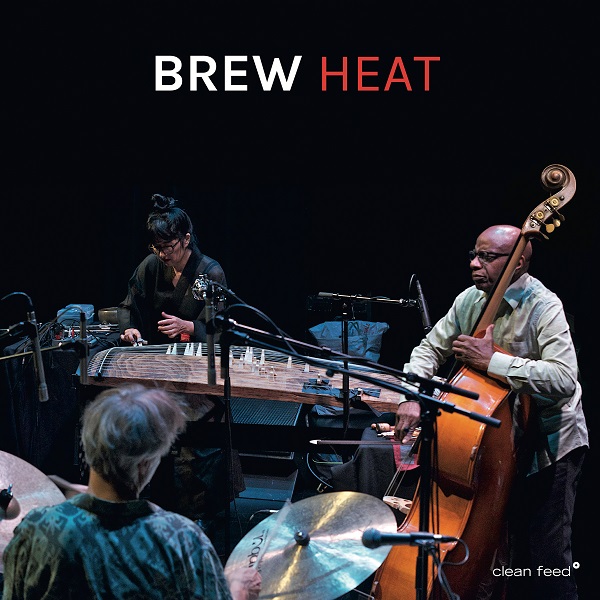
Brew
Heat (1998-99)
Miya Masaoka koto, electronics | Reggie Workman bass, percussion | Gerry Hemingway drums, electronics
Between Reflections (2019)
Miya Masaoka koto, monochord (dan bau), electronics, percussion | Reggie Workman bass, percussion, musical saw, didgeridoo | Gerry Hemingway drums, voice, vibraphone, electronics
€ 15.90
This double recording offers two different experiences of the collective trio Brew with Miya Masaoka, Gerry Hemingway and Reggie Workman. These are two separate recording sessions, twenty years apart from each other, “Heat” from 1999, and “Between Reflections” from 2019. For listeners familiar with the music that Hemingway, Masaoka, and Workman have each recorded with other ensembles (BassDrumBone, MZM, or Trio 3, for instance), the interplay of Brew is unexpected and engrossing. At its core, Brew might be called an enterprise in the dynamics of mutual attunement: an astounding demonstration of sustained sensitivity to what percolates at the outer reaches of auditory perception as improvising musicians interact in real time. Moment by moment, their exchange constructs what Hemingway calls a “sanctuary” of sound, a “chance to be lured into a freedom in which our regulated lives are suspended” in a way that leaves us with a keener capacity for perception.
The trio dramatizes the subtle but stark differences between Masaoka’s koto and Workman’s bass, a matter not only of tuning but also of material (whether nickel-plated steel, nylon, or silk) and techniques of bowing and plucking (whether directly with the fingers or with tsume fingerpicks). The koto is a particularly labile instrument—it is capable of conveying the plaintive vulnerability of the human voice one moment and the sharp wail of an electric guitar the next, or even the wooden thud of a bamboo gamelan jegog—and its mutability somehow brings out and emphasizes the tonal breadth of the bass and drum set, too, in a way that might not come across as forcefully in a trio fronted by a horn or piano.
All three musicians deploy multiple instruments. Workman plays musical saw and percussion in addition to the bass, and in the 2019 session Masaoka switches to the Vietnamese monochord or dan bau (hooked up to a guitar amp) on a number of tunes including Cutting by the Pound, Cricket’s Paradise, and Tug. Hemingway and Masaoka also often make recourse to electronic sampling along with their acoustic instruments. As a result, it becomes difficult to identify each player as a single “voice” in the fabric. Instead the voices seem to proliferate—not three, but five, then four, then seven—as the sounds multiply and one can’t always tell where they’re coming from: is that metallic whine a bow against a saw or a dan bau, a drumstick scraped against the edge of a cymbal or a computer sample? The music rejects our inclination to reduce it to a set of individual statements; instead we are confronted with the elusive ebb and flow of a swarm or a cloud.
(press release excerpted from Brent Hayes Edward liner notes)
Heat (1998-99)
#1 & 2 recorded at Tedesco Studios, NJ Winter 1998 by Jon Rosenberg | #3-8 recorded at Knitting Factory, Nov 10 + 12. 1999 by Jon Rosenberg | Mastered by Jim Hemingway
Produced by Brew, edited by Gerry Hemingway & Miya Masaoka | Additional Post-Production by Gerry Hemingway
Between Reflections (2019)
Recorded November 2, 2019 Acoustic Recordings, Brooklyn, NY | Recorded by Michael Brorby | Mastered by Jim Hemingway
Produced by Gerry Hemingway
All photos by Robert Saxe except cover photo of Between Reflections by Jordan Hemingway | Executive production by Pedro Costa for Trem Azul | Design by Travassos
More music that may interest you